by Mary E. Ulrich | Jan 23, 2018
People First Controversy

Background:
There is controversy in the disability community about the use of People First or Person First language.
I’ve written several posts about People First language:
*Rosa’s Law,
*Stigma and segregation caused by labels like “mental retardation“ and,
*Challenge to bloggers to use People First language.
Some self-advocates on the Autism Spectrum disagree They feel parents want to deny “autistics” and “aspies” their unique voices. They say parents only want to destroy autism and cure their children.
I am proud to support Rosa’s Law and advocate for People First Language. Perhaps these personal stories will explain.
I’m going to start and end with “Wheelchair Becky” but also share some stories about the past history of people with disabilities, my son Aaron, myself, and my hope for the future.
Is People First Language important for “Wheelchair Becky”?
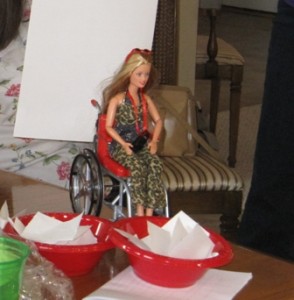
In a previous post: Building Community | Wheelchair Becky vs. Flat Stanley, I wrote about the way the Mattel Company thought “Wheelchair Becky” and “Black Barbie” would teach children about diversity and tolerance…and how it backfired.
I think People First language is part of the solution. If you disagree, that’s okay. It’s part of celebrating diversity.
Is People First language important for Aaron?
Aaron is my son’s name.
He has been depersonalized, reified and labeled by doctors, psychologists and other professionals as autistic, cerebral palsied, DD, MR, sensory deficit, movement disorder, severe/profound….
In the precedent setting Roncker case, the school psychologist testified under oath that Neill Roncker and others (like Aaron) had such low IQs “they wouldn’t know the difference between sitting next to a real person or sitting next to a rock.” So segregating them in separate schools with their own kind would make no difference. She considered their education a waste of school resources. Many people still agree with her.
So, I feel strongly People First language is important. Aaron is a person first. Others can give him labels. Some are medical and diagnostic but others are cultural: brother, son, uncle, cousin, friend, neighbor, patient, consumer, ….
This has nothing to do with wishing Aaron was cured. This is not denying the “autistic” culture. This has nothing to do with “disability pride.” It has everything to do with survival.
People First language reinforces the moral argument that people with severe disabilities are people and have a basic right to exist. A right to breathe, to be a member of the human race, to live with our families, go to neighborhood schools and community activities–rather than live in institutions.
Check out Parallels in Time history of people with disabilities It is filled with the abuse of those basic human rights. The more we know about our history, the more we understand the need to protect our rights to “life, liberty and the pursuit of happiness.” This is a daily challenge as we fight for caring staff, decent living conditions, health care, opportunities to be safe and belong to our families and communities. There are many people who see only the disability–and think that means we don’t need the same care and support–we are not really citizens, not really human.
Aaron is a “person” with wants, needs, likes and dislikes like everyone else. He is Aaron, that unique PERSON whom I love. He is Aaron a citizen with rights.
As I look at my life as a parent, advocate, teacher and friend to people with disabilities, I find I have excluded myself from my community. Yea, me–the advocate for inclusion.
Is Mary a Person First?
All mothers understand this conundrum. Especially when your child is so vulnerable. I’ve spent many years hanging around people working for the civil rights of people with disabilities i.e. Mothers of Special Children, Special Education Parent Groups, Arc, Autism National Committee, TASH…. I am a member of Disability World. Maybe not a primary consumer, but certainly a secondary consumer.
At some point, I realized I had to reclaim my own personhood. My personal resolution to rejoin the mainstream of my community included finding writers’ groups.
OVRWA
Fortunately, I found the Ohio Valley Romance Writers of America (OVRWA) in my community. These talented women have become more than mentors, they have become friends. I learned almost every one of them has a PEN Name, some have more than one.
Men with Pens
Men with Pens has also been a terrific community for beginning writers and bloggers. I’ve met James Chartrand who also wrote about using Pen Names and Pseudonyms.
Positive Solution: Writer’s Groups and Pen Names
So, it occurred to me: What if our stigmitized “Wheelchair Becky” started to include herself in these writing communities? After all, she’d graduated from the high school yearbook committee, right?
What if “Wheelchair Becky” chose her own Pen Name, became her own person, and like Flat Stanley started to integrate herself into the community?
Pen Names
Urban legend says one way to pick your Pen Name is to:
1. Write down the name of your first pet.
2. Write down the name of your street address when you
owned that pet.
I consulted with “Wheelchair Becky” and she agreed to make this into a community-building activity at the OVRWA holiday party.
Everyone wrote their pet’s name and put the papers in one red dish.
Everyone wrote their street address and put the papers into another dish.
Then “Wheelchair Becky” with the help of a friend, chose one name from each dish and VOILA—
Smokey Woods was born.
How do we build an Inclusive Community?
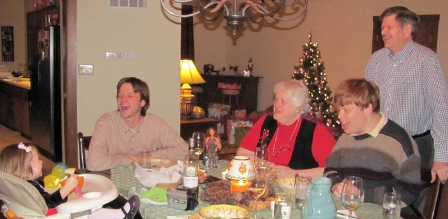
Smokey Woods toasts the New Year
In the tradition of Flat Stanley and many writers, Smokey Woods began to make friends and include herself into the community. Here (at the head of the table) she is toasting in the New Year with our family. (BTW: She doesn’t eat much and is a cheap drunk.)
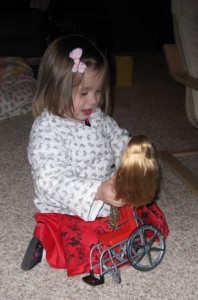
What a doll!
Here my precious granddaughter is playing with Smokey Woods the romance writer.
Smokey Woods is a doll, a toy. Smokey might use a wheelchair to get around, but she has a name.
My granddaughter represents the future. For Aaron, for me, for all people with disabilities. She will see people like Smokey in her classes and community. When she watches Glee on TV, she sees Artie singing and dancing. He also uses a wheelchair, but Artie has a name–and it doesn’t start with “wheelchair.”
Names matter. Aaron is Aaron. Mary is Mary.
I’m not promoting People First language because I am looking for a cure. I’m looking for survival and ways to prevent the abuse and segregation of the past. I’m looking for community inclusion.
For Aaron.
For myself and my family.
For all the next generation of little kids who will be learning about diversity by playing with dolls and watching TV.
I also think Mark Twain, Dr. Seuss and all the other writers who use Pen Names would approve.
Keep Climbing: Onward and Upward
All my best,
Mary and Smokey
Your Turn:
Did this make sense? Are there important reasons to use People First Language? Can we learn more about community inclusion and what it means to be a real person by looking at our language and the names we call each other? Do we need to study the past so we can move forward? In the comments please share your ideas.
by Mary E. Ulrich | Dec 25, 2017
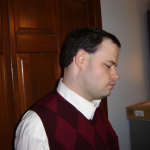
Blake Roberts an expert on DECtalk programming
Do You Hear What I Hear?
Do You See What I See?
In 1962, the song Do You Hear What I Hear? became an instant success when its lyrics asked us to hear, see, listen and “Pray for Peace, People Everywhere.” 1962 was a time of fear and uncertainty–much like 2017.
Today, as the year is coming to an end, I invite you to journey virtually to the Middle East–to the land of shepherds and millions of stars Listen and See this new version of a holiday classic.
‘Tis a Season of Magic
Blake Roberts and Pastor Snoopy Botten are musicians and visual artists who have collaborated on many CDs. Both are artists who inspire us to reach for the stars.
Their magic is their vision, talent and… a speech synthesizer with DECtalk software which helps people who can’t sing with words–sing with tech. Those who can’t see–paint with tech.
The result is poetry in motion.
Enjoy!
Do You Hear What I Hear? |Music and Visual Art
Do you hear what I hear?
In Blake’s Words:
Dectalk is a speech synthesizer that can be programmed to sing. I like Dectalk because I enjoy making it sing. Additionally, an almost infinite number of voices can be created with it.
Snoopi is a good friend of mine whom I met on the Internet several years ago. We enjoy working together on the CDs Snoopi has produced over the past couple of years. I did all the DECtalk programming and Snoopi mixed my DECtalk file with the karoake track.
My friend Snoopi is the same Snoopi you know on Facebook.
Snoopi programs Dectalk because it lets people who can’t talk sing like everyone else. I program Dectalk because I enjoy it.
I program songs at the same level of excellence as Snoopi. In fact, I am slightly better in some areas. Snoopi is the best Dectalkist in the world, I am second best. We never intended to be first and second best, we just are.
In summary, programming Dectalk is my favorite thing to do. Blake
More information about Blake and Snoopi:
If you would like to contact Blake Roberts go to: [email protected]
If you would like to contact Snoopi Botten email Snoopi at [email protected].
The video below is about Snoopi. Imagine, he sang the National Anthem for a professional baseball game. Don’t you love his confidence and spirit? His goal is to get a Grammy–and I think he will.
Keep Climbing and Singing: Onward and Upward
All my best,
Mary
What do you hear? See? Think? Want to discuss?
What did you think of Blake and Snoopi’s version of “Do you hear what I hear?” Do you know anything about DECtalk? or other programs to help people with disabilities talk/sing/dance/make beautiful art? I was struck how their work makes me listen and see differently, how it helps me see “goodness and light.” What about you? Do you know anyone who might also be interested in collaborating with Snoopi or Blake? Does their can-do spirit remind you of Aimee Mullins?
by Mary E. Ulrich | Dec 2, 2017
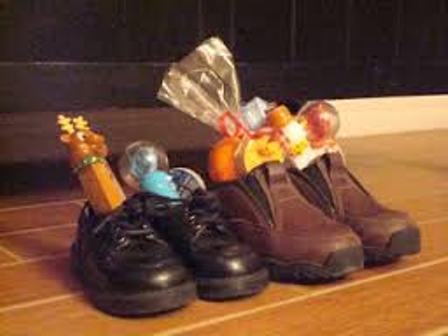
St. Nicholas treats
—
Jolly Ole St. Nicholas| Christmas List Disability Style
(Parody on popular Christmas carol)
In our family, December 6 is the night you leave your Christmas wish list in your shoes or stockings. The German tradition says St. Nicholas comes when you are asleep, exchanges your list for a small bag of goodies and then delivers your list to Santa.
I’ve shared some of our great family stories from when my sons were younger in St. Nick and the Batman socksand St. Nick| Two Special Sons.
Aaron turns 38 years old next week. So what would a Christmas wish list look like for a parent of an adult with autism and developmental disabilities?
The old kindergarten teacher in me thought you might want to sing along as I make a parody of the popular Christmas song, Jolly Ole St. Nicholas, and send my Christmas list out to virtual Santa Land.
Jolly Ole St. Nicholas, lean your ear this way.
Don’t you tell a single soul what I’m goin’ to say?
Christmas Eve is coming soon, now you dear ole man.
Whisper words of hope for us, reassure us if you can.
Aaron’s survived the ups and downs of another shaky year,
Thank you for our family and friends who are so very dear.
We did our best to make things work, but the path’s not clear.
Please St. Nick, we beg of you, hear our fervent prayer:
Aaron needs a roommate quick, one with family ties.
Someone who will be his friend, could be girl or guy.
An IO waiver would do the trick, at least a level 5.
Someone who‘s a gentle soul who wouldn’t harm a fly.
Aaron voted for our President he knows his fate depends
On Medicare and Medicaid and the generosity of friends.
He wants to know HUD will exist for the house he now calls home.
He wants to meet his neighbors not spend his time alone.
Keep him safe and free from harm, find us staff who care.
No more elves with phony smiles, who do whatever they dare.
They’re now suspended by the state and deserve lumps of coal.
Assure us our government has the resolve to fill their role.
Aaron wants a healthy life, join groups and have some fun.
He wants to swim and ride a horse before next year is done.
Aaron’s mom and dad love him so, but worry night ‘n day.
Dear St. Nick we count on you–Aaron’s in your hands today.
Comments:
What other things would you ask St. Nick for? Any stories to share?
Did you check out the Batman socks story link, it’s a good one. 🙂
Keep Climbing: Onward and upward.
All my best,
Mary
—
Related Posts about St. Nick and Christmas:
Mom’s I.E.P. for the Holidays
St. Nicholas meets the Disney Princesses
There’s no Santa Claus| Transformational Experiences
Age Appropriate Activities for People with Disabilities| Chocolate Covered Fun.
—-
by Mary E. Ulrich | Aug 26, 2017
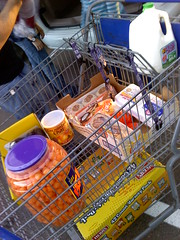
 photo credit: crimsong19
photo credit: crimsong19
Building Community: One Grocery Trip at a Time
With Aaron, my son with the label of autism, every trip to the grocery is an adventure.
Before we go, I usually do an ecological assessment (click here) and use some of the skills Aaron learned in his functional curriculum when he was in school.
Establishing Routines
Over the years and with lots of practice, I know what Aaron likes and dislikes. I try to make the shopping trip a good experience for both of us.
We try to go in the morning when the store isn’t crowded. We’ve developed a system where I walk in front of the cart making sure there is no person or display in the way. Aaron then follows pushing the cart with both hands on the handle.
Aaron is really good at following and knows to stop when I stop. He seldom bumps other people or the displays. This is a skill we have worked on for years and practice every week. I am really proud Aaron can do this.
We usually go to the same store.
That way Aaron is familiar with the physical space and layout. He knows the grapes and carrots are on the right front, the bread is in the right back, and after we pick up the milk and yogurt on the far left we will head to the checkout lanes. We usually only buy about ten items so the wait in line is short. We try to build a routine and structure into the experience.
We try to build a relationship with the store personnel.
This store was only a mile from where Aaron went to high school but in the suburbs we rarely see anyone we know. One of the baggers used to be in the special education program. She does a good job and always says hello. Some of the regular shoppers talk to her by name. She is one of our special ed. success stories and has been employed for over 10 years.
But I never know what’s going to happen.
Yesterday we went to the grocery near Tommy’s house because we wanted to let his dog out for him. Even though it was the same chain we always go to, the store was set up differently. STRESS.
I thought noon on a Sunday would be okay, but it was packed and everyone was in a hurry because the football game was due to begin at 1 PM and the only way to survive a football game is with lots of beer and snacks. STRESS. STRESS.
Being ready for surprises
Aaron did pretty well. We got our groceries and went to the car. I was putting the bags in the trunk when Aaron started pounding on the roof of the car next to us. He’s never done that before.
The young man was getting his two young daughters out of the passenger side. He looked up and yelled, “Hey, stop that!”
Quickly I grabbed Aaron and was about to get him into his seat when Aaron pushed me away and again pounded on the top of the car. This time the guy came over to our side of the car.
I started to apologize when the guy said, “Aaron, is that you?”
Aaron gave him a side-ways glance.
I was stunned and didn’t quite know what to say. I looked at the guy and he looked at me, and he repeated, “Is that Aaron?”
There wasn’t much room in the space between the two cars. I took a deep breath and turned Aaron toward the young man. “Aaron do you know him?”
Instead of punching Aaron, the man gave Aaron a high-five.
I fumbled out a, “How do you know Aaron?” and the young man said they went to high school together. He said he used to come into Aaron’s class and take him to the gym. He said he and Aaron used to eat lunch together.
He touched Aaron’s arm and guided him over to the other side of his car and introduced Aaron to his two children who were about 5 and 3 years old. He told them Aaron was a friend from school and then had Aaron give them each a high-five.
Aaron was strangely quiet. He patted the younger child on the head and said, “Ahh.”
I thanked the man for saying hello. He said his name was Todd and he asked a couple questions about where Aaron lived.
We both talked about how Aaron must have recognized him and since he didn’t have any words, he used the pounding on the car to get attention. We both thought that was very clever of Aaron.
Finding More than Groceries
When we worked so hard for inclusion for Aaron in the public schools, we dreamed that Aaron would have a community of people who knew and accepted him. People who could see his gifts and strengths.
Every once in a while we have a unique success story that makes all that hard work worth it.
We’ve never expected big monumental experiences. This magic moment where Todd remembers Aaron and thinks enough of him to want to introduce him to his children–that’s big enough.
YOUR TURN
I hope you will check out a couple of the other blog articles and share your thoughts.
Do you have any community experiences to share? Any magic moments?
Do you think the future will be better for adults with disabilities because of inclusion in the schools?
Keep Climbing: Onward and Upward
All the Best,
Mary







